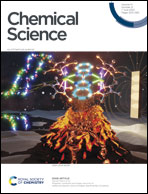Copper-catalyzed synthesis of β-boryl cyclopropanes via 1,2-borocyclopropanation of aryl olefins with CO as the C1 source†
Abstract
Cyclopropane represents one of the most critical rings and has been found present in various bioactive compounds, especially in clinical medicines. It can be synthesized by the reaction of olefins with diazo-derived carbenoids which are potentially hazardous. Carbonylation is a powerful tool for synthesizing carbonylated or carbon-extended compounds. In this communication, we describe a straightforward approach for synthesizing β-boryl cyclopropane derivatives catalyzed by an inexpensive copper catalyst with CO as the C1 source. This reaction was mediated by an in situ generated carbene intermediate and afforded a wide range of cyclopropane-containing organoboron compounds in moderate to good yields.

- This article is part of the themed collection: 2023 Chemical Science HOT Article Collection


 Please wait while we load your content...
Please wait while we load your content...